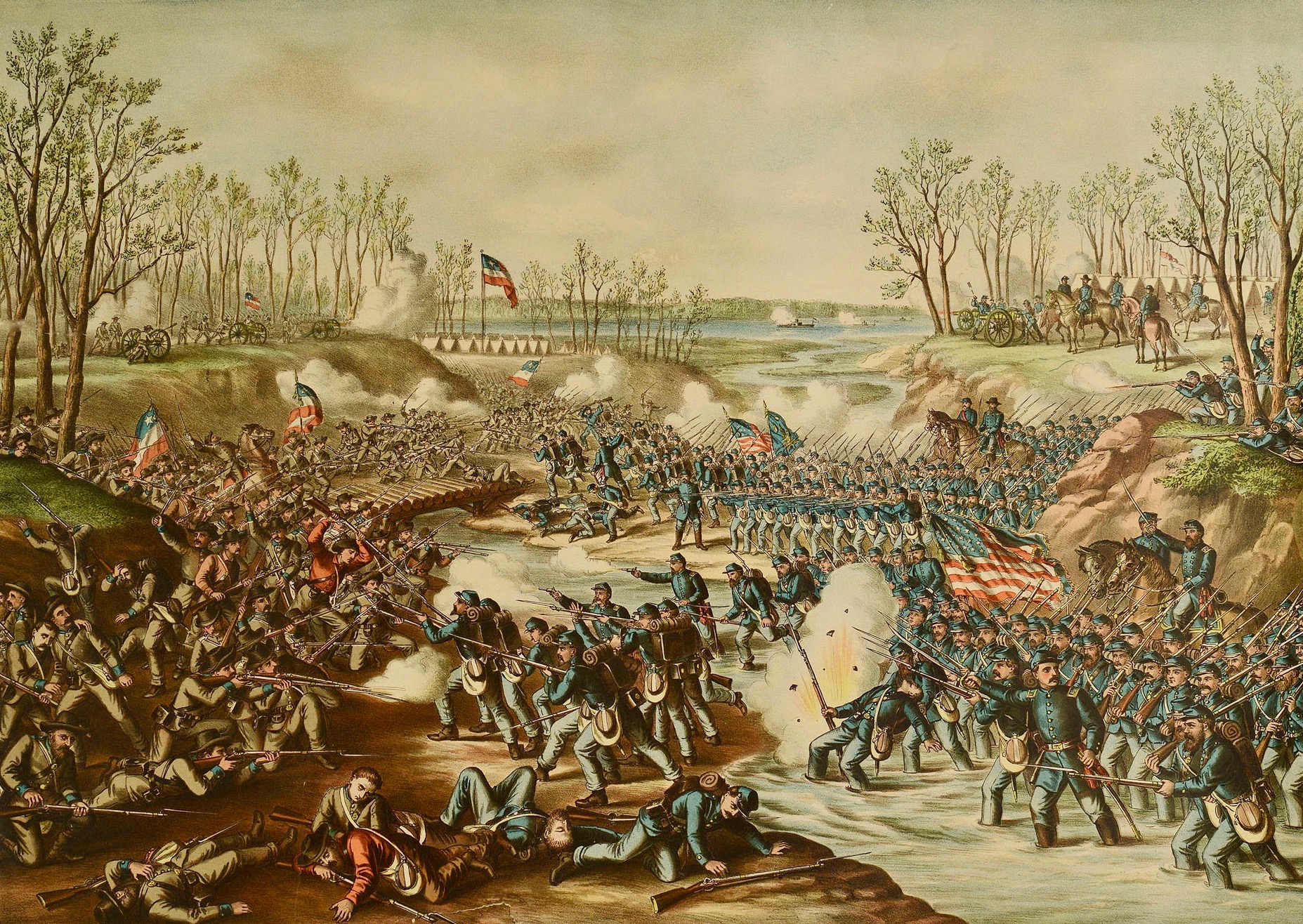Arts & Entertainment
Review: New Edition of Grant’s “Memoirs” Does Honor to One of the Great Presidential Autobiographies

After a narrow victory in the Battle of Shiloh (April 6, 1862), General Ulysses Grant recognized that Southern forces fought out of conviction, not bravado, and that the war would not be won easily: “I gave up all hope of saving the Union save by complete conquest.” Credit: Kurz & Allison chromolithograph (1886).
The Personal Memoirs of Ulysses S. Grant. Edited by John F. Marszalek, with David S. Nolen and Louie P. Gallo. Belknap / Harvard University Press, 784 pages, $39.95.
At Shiloh Church in 1862, on an April morning when he thought the war was almost won, Ulysses S. Grant was hit hard by a surprise attack: gray-clad regiments slamming into his soldiers’ bivouacs, massed Confederate artillery firing on his lines, his new recruits running away in panic. Shiloh was the bloodiest battle yet fought in North America—the sharpest crisis Grant had faced. Yet he kept his head, steadied his troops and told his friend Sherman that they would whip the enemy tomorrow. Grant seemed unassuming, but his self-confidence was not misplaced.
In the summer of 1884, after a triumphant military career and a checkered postwar career, Grant found himself once more almost overwhelmed by fate. He had cancer in his throat, and faced a perfect storm of further afflictions. Once more, with coolness and quiet determination, Grant found something of a way out. John Marszalek observes:
“As he had to deal simultaneously with his cancer, his left leg injured the previous Christmas, neuralgia for which he had to wear a skull cap, his long-recurring migraine headaches, and a bankruptcy of major proportions, Ulysses S. Grant began to seriously consider doing what he had said he would never do: write his memoirs.”

John F. Marszalek, editor of The Personal Memoirs of Ulysses S. Grant. Photo Credit: Mississippi State University
Grant’s cancer was fatal, but his book survived him. The Memoirs restored his family’s fortunes and his reputation. This handsome new edition, edited and carefully annotated by Marszalek and his cohorts at Mississippi State University, does honor to a work that has been hailed as the best presidential autobiography and the greatest military memoir since Caesar’s Commentaries.
A reader from Mississippi will note how crucial his time in Mississippi was to Grant. His success at Vicksburg brought Grant to national attention, and Northern Mississippi was the place where Grant came to understand the war and determined how he would bring it to a close.
Grant blamed the fire-eater politicians of the South for starting the war. “The Southern slave-owners believed that, in some way, the ownership of slaves conferred a sort of patent of nobility—a right to govern independent of the interest or wishes of those who did not hold such property,” he wrote. “They denounced the Northerners as cowards, poltroons, negro-worshippers; claimed that one Southern man was equal to five Northern men in battle.”
Across the South, as Grant saw it (and Karl Marx, looking on from London, thought the same), the slave-owners had seized power after Lincoln was elected, silencing opposition and pushing through secession ordinances.

Before Shiloh, Grant had sought to protect citizens’ private property. Afterward, he followed a policy of destroying property that might support the Confederate war effort. Here, Union troops destroy a railroad line in 1864. Photo Credit: Library of Congress.
For the first year of the war, Grant had thought the slave-owners’ grip on the Southern states was tenuous and would easily be crushed. In February 1862, he captured Fort Henry and Fort Donelson, bringing Kentucky and Middle Tennessee under federal control. Only after Shiloh, when the Confederacy threw a fresh army at him, and he came into routine contact with a population that supported secession, did his opinion change.
“Up to the battle of Shiloh I, as well as thousands of other citizens, believed that the rebellion against the Government would collapse suddenly and soon, if a decisive victory could be gained over any of its armies,” he wrote. “Donelson and Henry were such victories … But when Confederate armies were collected which not only attempted to hold a line further south, from Memphis to Chattanooga, Knoxville, and on to the Atlantic, but assumed the offensive … then, indeed, I gave up all idea of saving the Union except by complete conquest.”
As John Keegan put it, Grant learned that Southern troops fought out of conviction, not bravado. It would be a long war, he realized: “One side or the other had to yield principles they deemed dearer than life before it could be brought to an end.”
“Up to that time,” Grant wrote, he had scrupulously protected the private property of citizens “without regard to their sentiments, whether Union or Secession.” After Shiloh, he ordered a change. “Supplies within the reach of Confederate armies I regarded as much contraband as arms or ordnance stores … Much was destroyed without receipts to owners, when it could not be brought within our lines, and would otherwise have gone to the support of secession and rebellion.”
By December 1862, Grant was in Oxford, planning to advance south through Grenada toward Vicksburg. Confederate cavalry under Earl Van Dorn raided Holly Springs and destroyed the supplies that Grant had amassed for this campaign. Grant halted his drive south, but he was unfazed. He sent out foragers, “all the wagons we had,” to collect provisions along the route back to the Tennessee border.

With Grant’s troops occupying Oxford, locals gloated after Confederates destroyed Union supplies in nearby Holly Springs, but they changed their tunes once they learned of Grant’s plan to replenish his provisions.
“The news of the capture of Holly Springs and the destruction of our supplies caused much rejoicing among the people remaining in Oxford,” Grant wrote. “They came with broad smiles on their faces, indicating intense joy, to ask what I was going to do now without anything for my soldiers to eat. I told them that I was not disturbed; that I had already sent troops and wagons to collect the food and forage they could find for fifteen miles on each side of the road. Countenances soon changed, and so did the inquiry. The next was, ‘What are we to do?’ My response was that we had endeavored to feed ourselves from our own northern resources while visiting them; but their friends in gray had been uncivil enough to destroy what we had brought along, and it could not be expected that men, with arms in their hands, would starve in the midst of plenty. I advised them to emigrate east, or west, fifteen miles, and assist in eating up what we left.”
There is Grant’s style and perspective: direct, plain-spoken, sharp as a jest but delivered without a smile, without contempt and without any false note of apology.
In the spare Roman dignity of Grant’s sentences, there is often a sense that the author has held something back. Grant does not mention the alcoholism that haunted his career, or complain of the penury from which the war rescued him, or dwell upon his cancer. That side of his story is sketched in by annotations in this edition, with an excellent short introduction that focuses on how the Memoirs were written and published.
One small accident of history and typography may be noted. In Chapter Thirty, the compositors for the first edition rendered as “Cottage Hill” the name of the hamlet northwest of Oxford; and in this edition, like many before it, “Cottage Hill” that name remains.
Allen Boyer is Book Editor for HottyToddy. A native of Oxford, he is the great-great-grandson of Pvt. Thomas B. Holaday, of Company F, 59th Indiana Infantry Regiment, who served under Grant’s command during the siege of Vicksburg. His book “Rocky Boyer’s War,” a WWII history based on his father’s wartime diary, was recently published by the Naval Institute Press.






























Rod Duren
October 26, 2017 at 10:43 am
President (Gen.) Grant and Gen. Sherman of the scorched earth campaign across Georgia were both slave owners until well after the Civil War.
Allen Boyer
October 26, 2017 at 12:32 pm
Sherman I can’t speak to without research, but Grant’s connections with slavery were a little more complicated. I had wanted to look into this and Ron Chernow did, in his biography (reviewed in HottyToddy last week). Grant’s own family were Ohio Methodists, abolitionists. His wife’s family, from Missouri, were slave-owners. His father-in-law, Colonel Frederick Dent, with whom Grant did not get along, gave Grant’s wife Julia the use of four young slaves in the 1850’s. He did NOT give ownership of the slaves to Julia. Likely this was because Col. Dent feared that, as Julia’s husband, Grant would free them (he had said as much). The one Dent family slave whom Grant ever owned, William Jones, was apparently given by the Dents to his family. Grant freed Jones in 1859, at a time when he needed money badly and could have raised a good sum by selling the man. Grant was farming at the time and worked alongside Jones and two free black men whom he hired. Thanks for reading the review!
Andy McWilliams
October 28, 2017 at 6:08 pm
Grant was a find one to criticize slave owners. And Sherman had just been released from a mental sanitarium weeks before his terrorist march through Georgia. https://www.nps.gov/ulsg/learn/historyculture/slaveryatwh.htm
Andy McWilliams
October 28, 2017 at 6:19 pm
History is written by the victors. They conveniently leave this out. https://www.npr.org/books/titles/139550918/a-first-rate-madness-uncovering-the-links-between-leadership-and-mental-illness
Bill McNew
February 13, 2018 at 3:56 pm
In my experience most high ranking military officers are a little bit touched in the head anyway, then or now
Bill McNew
February 13, 2018 at 4:00 pm
Allen it is interesting the parallels between Grant and Lee. Lee never bought any slaves himself and the ones he did actually own he got through his wife in a dowry. Before leaving for war he freed them all. Even so they stayed at the house and ran things. The former slaves did not like the government burying dead soldiers on the property either.